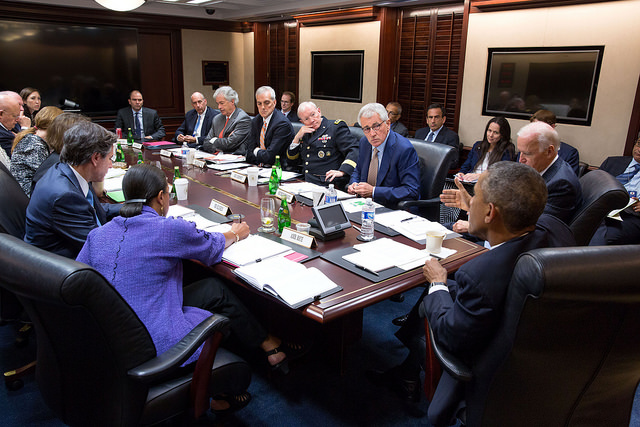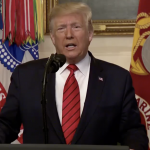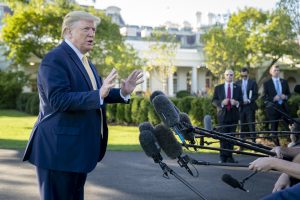by Robert E. Hunter
“Those who in quarrels interpose, are apt to get a bloody nose.”
—Lord Palmerston on keeping Britain from supporting the South in the American Civil War.
This Wednesday night President Obama will lay out his strategy to “degrade and ultimately defeat” the Islamic State (also known as ISIL/ISIS). “It is altogether fitting and proper that [he] should do this,” especially because of the nature and possible length of the US commitment that will be involved, the variety of instruments that will need to be employed, the indispensability of American leadership if anything serious is to be done, and the number of countries and organizations whose engagement will be needed. The presentation to the nation is also important to “go over the heads” of Mr. Obama’s opponents in Congress, too many of whom oppose him no matter what he says and does—a mark of the dangerous dysfunction in today’s Washington.
His presentation, however, must not only discuss the ways and means and even the “why”—recent horrific events seem to have answered that last point. It must also offer his vision of the end game or— since this is the Middle East with all of its sharp corners and blind alleys—at least what he is trying to achieve.
US Interests and Values
The most important requirement for analysis is for the president to see the Middle East, first and foremost, in terms of our nation’s interests and as a total package, not just as a set of loosely connected, separate elements. Other countries depend on us to promote their security, and most also want things from us that do not necessarily comport with our own interests. That is not unnatural. Even in the closest of formal alliances—as in NATO or in the bilateral US relationship with Canada—every member of the alliance or coalition will see its situation differently from how others see it, and each will view the overall set of facts through its own independent, national lens.
It would take too long to recite all the factors that define US interests, though most analysts would include the following list:
- Preserving the unimpeded flow of hydrocarbons;
- Ensuring the security of Israel;
- Preventing elements within the region (states, groups, individuals) from exporting terror or taking other hostile actions that affect either us or our allies;
- Promoting the ability of Americans and others to do business and travel safely in the region;
- and seeking an inchoate but still palpable quality called “stability”—or, to break that concept down, emphasizing at least “predictability.”
Along the way we should try to promote human rights and representative governance, which we call “democracy,” though that is not necessarily the same thing, as well as economic and social advances that will promote other objectives, including stability and political modernization.
Having got that out of the way, it is important to reassess some of the elements of what we have been doing that may or not be consistent with these objectives.
Iran’s Role
We have been preoccupied with stopping Iran from getting nuclear weapons, and the negotiations with Iran by the so-called P5+1 nations (US, UK, France, Russia, China and Germany) appear to be close to agreement. But even if the US government decides what is best for us and for keeping Iran from obtaining a “break-out” capability, and even if Iran is prepared to do what is necessary to satisfy US and P5+1 demands, there are countries working to keep the talks from succeeding. Notable among these is Israel, and some of the Persian Gulf Arab states, especially Saudi Arabia, which is at best ambivalent about seeing the negotiations succeed. Israel’s preoccupation with its own security is understandable, and the US is sensitive to Israeli concerns. But the US must make its own judgments; and it should be able to make those judgments without political pressures from Israeli Prime Minister Benjamin Netanyahu, or other non-Americans, especially as applied through Congress. The same can be said of both the Israel lobby and the less visible but also potent oil lobby.
For these opponents of an agreement with Iran, the issue is not about just the Iranian nuclear program, but also the geopolitical competitions that are multifarious throughout the Middle East. Keeping Iran from rejoining the international community is a key goal of several Middle Eastern states, but there is no reason for this to be America’s goal, especially since the fire in the Iranian revolution has for some time been burning lower and we need Iranian cooperation in places like Afghanistan (where our two countries worked together in overthrowing the Taliban in 2001), in countering ISIS through tangible actions, in keeping the sea lanes open through the Strait of Hormuz and countering piracy, and potentially in helping to foster a positive future for Iraq. But the US can’t do any of that if its relations with Iran are held hostage by others who not only seek to define the terms of a final nuclear deal, but also prevent Iran from becoming a serious regional power.
“Assad Must Go”
The fall of Middle Eastern dictators in the so-called Arab Spring led (though in the case of Egypt and Libya the aftermath has hardly been positive) to the belief that Syrian President Bashar al-Assad should be next. We continue to talk about “arming moderates,” but no US leader has ever articulated what would come after Assad. There is a basic assumption that, when Assad is gone, all will be rosy. The opposite is more likely true. Added to the ongoing carnage would be the slaughter of the minority Alawites. The risks of a spreading Sunni-Shia civil war would increase dramatically, even more than now. The irony is that many who now worry about ISIS argue that it would not have progressed this far if we had only “armed the moderates” in Syria. But given what would have likely happened if they had succeeded, this argument is nonsense. Yet even now the administration, along with academic and congressional critics, fails to address the consequences of its own rhetoric about getting rid of Assad; that statement has become a mantra, disconnected from any serious process of thought or analysis.
Never-Ending War
Much of what challenges us today derives directly from the misbegotten US-led invasion of Iraq in 2003, which we blundered into willy-nilly, with intense support from an unthinking commentariat. Well, these chickens have come home to roost and have caused the hen house to overflow. The US overthrew a minority Sunni government in Iraq that was ruling over the majority Shias and the Kurds. Now, in the eyes of Sunni states, the assault on Assad and the Shia minority in Syria would simply redress the balance.
But no US interests would be served through continued US involvement in a region-wide Sunni-Shia civil war—which is what we’re really talking about here—that we have been involved in, on the Sunni side, for several years, just as we actively sided with Saddam Hussein in his war against Iran in the 1980s.
Sponsors of Terror
Whether we want to admit it or not, much of ISIS’s adherents and what they do derives from actions by putative US friends and allies in the region. Saudi Arabia can argue that the kingdom doesn’t export terrorism, but much of the inspiration and funding for the worst Islamist terrorism comes from Saudi Arabia and some other Gulf Arab states, stemming from the principle of “You can do whatever you want, but just not here at home.” For years, American and other Western troops have died in Afghanistan as a direct result of this “see no evil” policy. The US president needs to make clear that any further inspiration for terrorism, from anywhere in the Middle East, will have consequences. He has yet to do so.
Key Issues
There are many other elements that need to be dealt with in a forthright fashion, within the precincts of the White House if not in public. These include an honest assessment of the importance to the United States of resolving the Israeli-Palestinian conflict and what genuinely needs to be done about it, along with beginning to devise a long-term security strategy and structures for the region as a whole. For now, here’s how the US can start:
- Tell all our friends and allies who are working to prevent Iran from obtaining a bomb-making capacity that we share that interest, but that we—who in the final analysis provide for their security—will determine what is best in the negotiations with Iran, and they should back-off in their efforts to prevent success;
- Understand and accept that we do have some compatible interests with Iran, beginning in Afghanistan and against ISIS, and we will not let these interests be held hostage to the desires of other Middle East states who want to keep Iran isolated for their own geopolitical reasons;
- Persuade our European allies to understand that they, too, have “a dog in this fight” and cannot be as half-hearted in support of Mr. Obama’s “degrade and ultimately defeat” strategy against ISIS as most of them were at last week’s NATO summit in Wales;
- Review our analysis of the situation in Syria and understand that we cannot continue to call for “Assad to go” without having some sense of what would happen next, what it would mean to us, and the cost to the United States of having to sort the matter out. In practice, that means that, at least for now, Assad is better than the likely alternatives;
- Make clear that anyone in the Middle East who supports or tolerates terrorism, directly or indirectly, will pay a heavy price with us;
- Put all the Sunni states on notice that we will not do their business for them in righting the balance with the Shia or in supporting their geopolitical ambitions that are not also consonant with US national interests (the same goes with Israel);
- And, above all, serve notice that we will not continue to be a party to any of the civil wars taking place in the region.
Maybe it is already too late to get this right, in America’s interests. But President Obama can start by “getting up on his hind legs” and showing some anger—as he has been doing of late. He can finally gather around him people of experience who both understand the Middle East and the craft of strategy. And he can insist that the US put its own interests first and stop letting itself be a cat’s paw for anyone else.
There is thinking and acting to do, if, following Palmerston’s injunction, we are to avoid making worse the bloody nose we have already suffered by allowing ourselves to become part of the Middle East’s civil wars.






Better late then never, huh? Tell us Mr Hunter, if the Saudis and any other members of OPEC control the spigot, while also exporting terrorism, then how does the U.S. control the flow of hydrocarbons? Also, Israel is a problem, so to put it as the U.S. ensuring the security of Israel as you noted, then like every other action where the U.S. has meddled in the affairs in the M.E.N.A., this hasn’t accomplished any peaceful resolution there. Who ever planned the idea that waging war over there is good, belongs in the nut ward in a straight jacket. As for “O” showing he has the balls to put the U.S. first, do you really believe that’s possible, especially after the past almost 6 years where he’s sat back letting the neocon idiots run a muck? I suppose there’s always that hope/optimism that people who believe in him keep saying, but it’s getting near the end, and just what have we got to show for all of it? Actions speak louder than words, but so far, well, you keep giving your opinions, as do others.
What about arm lobby?